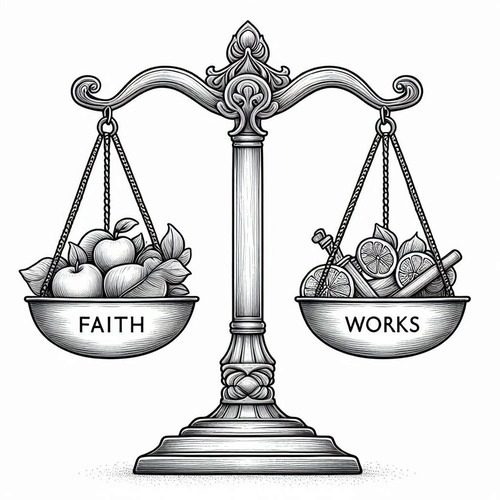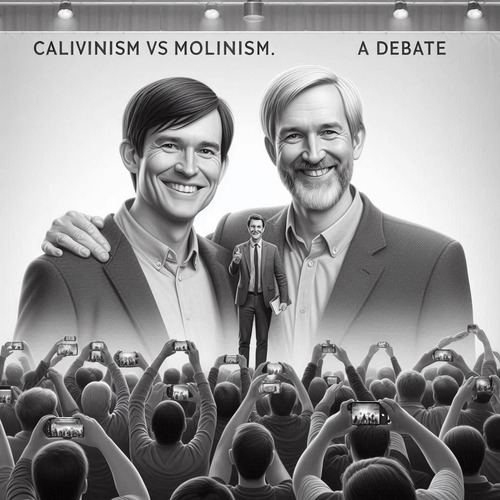Does Denying God’s Sovereignty Mean Denying the Gospel?
RC Sproul once warned denying God’s sovereignty “eviscerates” grace—a strong word meaning to gut or disembowel something, leaving only an empty shell. Jonathan Edwards went even further: he called God’s sovereignty “the sum of the gospel.”
These aren’t exaggerations from theologians looking to protect their system. They’re recognising something essential: God’s complete control over salvation isn’t optional theology. It’s the foundation on which the gospel itself stands or falls.
THE GOSPEL REQUIRES HELPLESS SINNERS
The good news only makes sense if there’s genuinely bad news first. Scripture doesn’t describe sinners as merely wounded or weakened, but as spiritually dead, hostile. And unable to choose salvation on our own.
- Romans 8:7-8 reveals complete inability. Paul writes “the mind set on the flesh is hostile toward God; for it does not subject itself to the law of God, for it is not even able to do so.” Notice the progression: hostility, refusal, inability. This isn’t describing people who need a little help; it’s describing people at war with God, and lack the capacity to surrender.
- John 6:44 confirms we cannot come to Christ on our own. Jesus declared, “No one can come to Me unless the Father who sent Me draws him.” That word “draws” carries the force of dragging or compelling—not merely wooing or inviting. Apart from God’s sovereign drawing, no one moves toward Christ.
- 1 Corinthians 2:14 shows spiritual truths are inaccessible to the natural mind. “The natural person does not accept the things of the Spirit of God, for they are folly to him, and he is not able to understand them.” The unregenerate person doesn’t just struggle with spiritual things; they’re fundamentally unable to grasp them.
Why this matters: If fallen humanity possesses autonomous ability to choose God—if an island of spiritual capacity untouched by the Fall remains somewhere in our nature—then grace becomes assistance rather than rescue. It becomes an opportunity we must activate through our own choice. But that’s not gospel; that’s cooperation. The gospel announces rescue for those who cannot save themselves.
GRACE THAT ACTUALLY SAVES
This leads us to the heart of why sovereignty is inseparable from grace. Edwards called sovereignty “the sum of the gospel” because true sovereignty means God doesn’t merely make salvation possible; He makes it actual.
- Ephesians 2:4-5 shows God acts, not we. “But God, being rich in mercy, because of the great love with which He loved us, even when we were dead in our trespasses, made us alive together with Christ.” Dead people don’t cooperate with resurrection. God alone acts, and God alone makes alive.
- Philippians 1:6 promises God completes what He begins. Paul expresses confidence “that He who began a good work in you will perfect it until the day of Christ Jesus.” The same God who begins salvation also completes it—sovereignly. This isn’t left to human maintenance or cooperation.
- John 10:27-29 guarantees eternal security. “My sheep hear My voice, and I know them, and they follow Me. I give them eternal life, and they will never perish, and no one will snatch them out of My hand.” This is sovereign grace—grace that actually accomplishes what it intends. No force external or internal can thwart God’s saving purpose.
- Ezekiel 36:26-27 reveals God’s irresistible transforming power. God promises: “I will give you a new heart, and a new spirit I will put within you. And I will remove the heart of stone from your flesh and give you a heart of flesh. And I will put my Spirit within you, and cause you to walk in my statutes.” Notice the repeated “I will”—God gives, God removes, God causes. This is grace that guarantees results.
Why Sproul warned this matters so much: If God’s grace can be finally resisted, then human will becomes sovereign over divine will. Salvation depends not on God’s accomplishment but on human cooperation. Grace offers an opportunity rather than exerting power. The ground of salvation shifts decisively from God’s work to man’s choice. You may use the word “grace,” but you’ve emptied it of its meaning—the shell remains, but the substance is gone.
ASSURANCE RESTS ON GOD’S SOVEREIGNTY
Here’s the practical test: Can you be certain of your salvation? Not arrogant, but assured. Not presumptuous, but confident. Only if God is completely sovereign over every aspect of salvation—beginning, middle, and end.
Paul describes what theologians call the “golden chain” of salvation: “Those whom He predestined He also called, and those whom He called He also justified, and those whom He justified He also glorified” (Romans 8:29-30). Notice the past tense even for glorification—the final stage of salvation. In God’s sovereign purpose, it’s already accomplished. This is why Paul can confidently declare nothing “will be able to separate us from the love of God in Christ Jesus our Lord” (Romans 8:38-39).
Jude describes God as the One “who is able to keep you from stumbling and to present you blameless before the presence of His glory with great joy” (Jude 24). Peter speaks of an inheritance “kept in heaven for you, who by God’s power are being guarded through faith for a salvation ready to be revealed in the last time” (1 Peter 1:3-5). Notice who does the keeping: God. Notice the source of power: God. Notice the guarantee: God’s sovereignty.
Remove sovereignty at any point in the process and assurance evaporates. You’re left wondering: Will I persevere? Can I lose what I’ve gained? Does my salvation ultimately depend on sustained human effort? These aren’t merely academic questions. They affect how believers live, pray, worship, and face death.
WHY THIS MATTERS SO MUCH
Edwards and Sproul weren’t overstating the case.
Strip away sovereignty and you fundamentally alter the gospel at every level.
- You change who saves. Is it God alone, or God plus necessary human cooperation?
- You change what saves. Is it grace alone, or grace plus human contribution?
- You change how salvation is secured. Is it divine guarantee, or human maintenance?
The biblical portrait never wavers: God “works all things according to the counsel of His will” (Ephesians 1:11). Christ “is able to save to the uttermost those who draw near to God through Him” (Hebrews 7:25). And God has arranged salvation precisely so “that no human being might boast in the presence of God” (1 Corinthians 1:29). Sovereignty ensures salvation brings glory to God alone.
This isn’t about defending a theological system. It’s about honouring what Scripture reveals—a God who doesn’t merely wish, hope, or try to save, but who actually accomplishes redemption for His people. A God whose grace doesn’t depend on human permission but overcomes human rebellion. A God whose purposes cannot be thwarted.
The apostle Paul concludes his magnificent exploration of God’s sovereign purposes in salvation with worship: “For from Him and through Him and to Him are all things. To Him be the glory forever. Amen” (Romans 11:36).
That’s the gospel. And it requires sovereignty at every point.
DENYING THE GOSPEL: RELATED FAQs
How would Arminian theologians answer the title question differently? Most Arminians would say no—denying meticulous sovereignty doesn’t deny the gospel because God’s grace can be truly gracious while still resistible. They argue libertarian free will (the ability to choose otherwise) actually magnifies grace by making our acceptance meaningful rather than coerced. However, this shifts the decisive factor in salvation from God’s effectual work to human choice, making grace necessary but not sufficient. The Reformed response is that Scripture consistently presents God’s saving work as accomplishing what it intends (John 6:37, Philippians 1:6), not merely making salvation available.
- What do contemporary Reformed scholars say about sovereignty and evangelism? Scholars like Timothy Keller and John Piper argue sovereignty doesn’t undermine evangelism—it empowers it. Keller pointed out that if conversion depends ultimately on human choice, evangelism becomes a sales pitch where success depends on our persuasiveness. But if God sovereignly opens hearts (Acts 16:14), we can proclaim truth boldly knowing He guarantees results. Piper emphasises that Jesus commanded us to evangelise precisely because God has elect people in every nation (John 10:16), making our labour never in vain. Sovereignty means evangelism is a discovery mission, not a rescue attempt dependent on human eloquence.
- How do Catholic and Eastern Orthodox views differ on this question? Catholic theology affirms God’s sovereignty but emphasises human cooperation through infused grace that enables (but doesn’t guarantee) right choices. Eastern Orthodoxy similarly stresses synergy—God and us working together in salvation. Both traditions would say sovereignty doesn’t require irresistible grace; God can offer prevenient grace that restores free will without violating it. The Reformed counter is that this still makes human will the decisive factor. It fails to account for texts like Ezekiel 36:26-27 where God doesn’t merely enable but causes obedience. If grace can be resisted finally, we’re back to human sovereignty over the salvific outcome.
Don’t verses like “God desires all to be saved” (1 Timothy 2:4) contradict Reformed sovereignty? Reformed theologians handle these texts in several ways while maintaining consistency. Some, like John Calvin, distinguish between God’s revealed will (His genuine pleasure in righteousness and grief over sin) and His decretive will (what He ordains to occur). Others, like James White, argue “all” refers to all types of people (Jews and Gentiles, kings and commoners) not every individual, fitting the context of 1 Timothy 2:1-4. Still others note if God’s desire were absolute and His power complete, universalism would follow—yet Scripture clearly teaches some perish. The Reformed position maintains God’s salvific purposes are always accomplished for those He intends to save while allowing for complex divine emotions we don’t fully comprehend.
- What did the Reformers themselves say about sovereignty and assurance? Martin Luther found his breakthrough precisely in understanding that salvation depends entirely on God’s work, not human merit or cooperation. His Bondage of the Will argues that unless God’s will is immutable and sovereign, Christians have no certainty of salvation. John Calvin believed assurance flows from election—if God chose us before the foundation of the world, no temporal failing can undo that eternal decree. The Westminster Confession (1647) connects sovereignty directly to comfort: believers “can never fall from the state of justification” because they’re kept by God’s power. For the Reformers, sovereignty wasn’t abstract theology; it was the foundation of peace with God.
- How do apologists like James White or Michael Horton defend this view? James White emphasises the “radical theocentricity” of Scripture—that God’s glory, not human choice, is the ultimate purpose of salvation (Romans 9:22-23). He argues synergistic systems inevitably make salvation a cooperative effort where man gets partial credit. Michael Horton stresses the covenant structure of salvation: God doesn’t negotiate terms but declares them, ensuring their fulfillment. He points to the contrast between the conditional Mosaic covenant (do this and live) and the unconditional new covenant where God promises “I will” not “you shall.” Both White and Horton argue that anything less than total sovereignty makes grace contingent and assurance impossible.
If God is completely sovereign over salvation, why does Scripture command us to believe and repent? This is where the Reformed doctrine of “compatibilism” matters—divine sovereignty and human responsibility are both true and compatible, even if mysterious to us. God commands what He alone can enable, and His commands reveal what pleases Him while His sovereignty ensures they’re obeyed by His elect. Consider: God commanded Lazarus to “come out” (John 11:43) even though Lazarus was dead and unable to comply—until Jesus gave him life. Similarly, God commands all to repent while sovereignly granting repentance to His chosen people (2 Timothy 2:25, Acts 11:18). The commands show our duty; sovereignty ensures the outcome. This isn’t contradiction but the mystery of how a transcendent God relates to His creation.
DENYING THE GOSPEL: OUR RELATED POSTS
- If God Is Sovereign, Why Bother Praying?
- Why Work Hard If God Is Sovereign and Already Knows the Outcome?
- Can a Sovereign God and ‘Lady Luck’ Co-Exist?
- Can God Be Truly Sovereign and Man Be Free? The Biblical Perspective
- Assurance of Salvation: Can I Really Know I’m Saved?
Editor's Pick

The One Man Mystery in Acts 17:26: Is It Adam Or Noah?
When the Apostle Paul stood before the philosophers at Mars Hill, he delivered an insightful statement about human unity: “And [...]

Megiddo Or Jerusalem: Where Did King Josiah Die?
Recent archaeological discoveries at Tel Megiddo continue to reveal evidence of Egyptian military presence during the late 7th century BC, [...]

Losing Your Life Vs Wasting It: How Are the Two Different?
AND WHY DID JESUS PRAISE THE FORMER? Jesus spoke one of the most perplexing statements in Scripture: “For whoever wants [...]

Can Christians Be Demon Possessed? What the Bible Teaches
Perhaps you’ve witnessed disturbing behavior in a professing Christian, or you’ve struggled with persistent sin and wondered if something darker [...]

Sacred Fury: What Christ’s Temple Cleansing Truly Means
Mark 11 records the crack of a handmade whip that echoed through the temple corridors. Tables crashed to the ground, [...]

Did Jesus Cleanse the Temple Twice?
OR DID JOHN DISAGREE WITH THE SYNOPTICS ON TIMING? One of sceptics’ favourite "gotcha" questions targets what they see as [...]

Self-Authentication: Why Scripture Doesn’t Need External Validation
"How can the Bible prove itself? Isn't that circular reasoning?" This objection echoes through university classrooms, coffee shop discussions, and [...]

Do Christians Need Holy Shrines? Why the Reformed Answer Is No
Walk into a medieval cathedral and you'll encounter ornate shrines, gilded reliquaries, and designated "holy places" where pilgrims gather to [...]

I Want To Believe, But Can’t: What Do I Do?
"I want to believe in God. I really do. But I just can't seem to make it happen. I've tried [...]

BC 1446 or 1250: When Did the Exodus Really Happen?
WHY REFORMED SCHOLARS SUPPORT THE EARLY DATE Many a critic makes the claim: “Archaeology has disproven the biblical account [...]
SUPPORT US:
Feel the Holy Spirit's gentle nudge to partner with us?
Donate Online:
Account Name: TRUTHS TO DIE FOR FOUNDATION
Account Number: 10243565459
Bank IFSC: IDFB0043391
Bank Name: IDFC FIRST BANK






